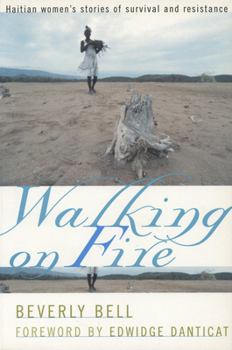Walking on Fire: Psychiatry and Eugenics in the United States and Canada, 1880-1940
Select Format
Select Condition 
Book Overview
Haiti, long noted for poverty and repression, has a powerful and too-often-overlooked history of resistance. Women in Haiti have played a large role in changing the balance of political and social power, even as they have endured rampant and devastating state-sponsored violence, including torture, rape, abuse, illegal arrest, disappearance, and assassination.In Walking on Fire, Beverly Bell, an activist and an expert on Haitian social movements,...
Format:Paperback
Language:English
ISBN:080148748X
ISBN13:9780801487484
Release Date:January 2002
Publisher:Cornell University Press
Length:288 Pages
Weight:0.88 lbs.
Dimensions:0.7" x 6.0" x 9.0"
Age Range:18 years and up
Grade Range:Postsecondary and higher
Customer Reviews
2 ratings
A very moving book
Published by Thriftbooks.com User , 15 years ago
I've been to Haiti and this book really made an impression on me...it tells the stories of so many women, in their own words and helps to explain many things that I have suspected about the very hard lives of the Haitian people and the women in particular.
Haitian Women's Struggle
Published by Thriftbooks.com User , 21 years ago
Beverly Bells Walking on Fire is extraordinary in that it brings to print first-person narratives of excruciating and harrowing violence, which are at once narratives of survival, resistance and overcoming. Bells book is effectively an edited volume of (mostly poor, mostly non-literate) Haitian womens testimonies about life in Haiti during and after the coup-etat against Jean-Bertrand Aristide (1991-1994), framed by Bells contextualizing analysis. Entering the anthropological conversations about everyday acts of resistance generated by James C. Scott (1990) Bells central argument is that Haitian women engage in resistance, or "the negotiation of power by the weaker against the strong," in many ways that are usually overlooked, and that "the definition of resistance is expanded to include any act that keeps the margins of power from being further encroached upon, even where the protagonist cannot expand those margins." Trapped at the bottom of a system of structured inequality, "if [a woman] does no more than maintain her resources and rights in the face of attempts by other people, institutions, or systems to deny her them then she practices resistance." (p. 5)Most of the women featured in the volume are members of one of the loosely organized coalitions of grassroots groups known as the "popular movement." Each woman, then, is engaged in some aspect of political organizing, collective action or cooperative living. A central theme in the women's narratives is that it is through collective efforts that meaning-making analysis is forged and dignity is recovered. In Bell's book, poor Haitian women come to an understanding of their situation, their victimization and themselves, that allows them to recover the selves that have been traumatized. It is this transformative process that the women in the book undergo--by speaking their stories to her comrades in collectives and, one senses, in recounting their narratives to Bell. Because of this transformation operating in most of the stories, the tone of the volume is often celebratory, even optimistic, in the face of relentlessly harsh realities.One extraordinary story is that of Tibebe ("little baby"), presented in a section titled "Resistance as Survival." A product of the rape of her mother, a servant, by her employer's son, she is born on a street corner and never issued a birth certificate or a proper name. She is given away by her mother to be a restavek, a child slave. When her biological aunt sees her as an older child, she realizes Tibebe is a relative, and gives her the name--and the birth certificate--of her biological father's legitimate daughter, who has just died. At the end of her father's life the family abandons him in his loss of fortune and it is Tibebe who pays for his funeral. Tibebe is finally taken to a women's group, where, she says, "They made feel like I exist in society. I became a person." (p. 44) Exemplifying the problems of structural poverty, the child slave





